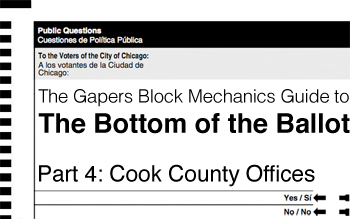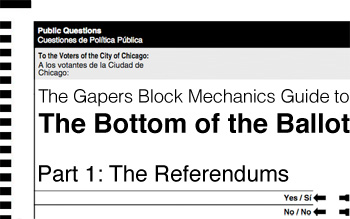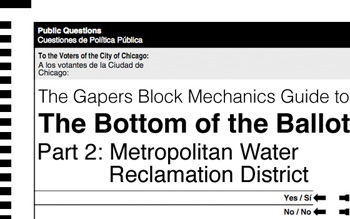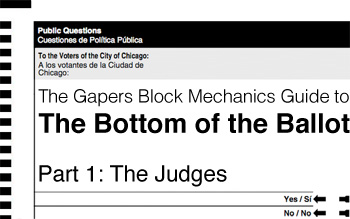My friend and much-beloved one-time political consultant Mike Fourcher published an editorial in the Center Square and Roscoe View Journals urging voters to vote against a non-binding advisory referendum on the ballot in many Chicago precincts: whether there should be an elected, representative school board (ESRB).
Mike makes some compelling but ultimately unsatisfying arguments as to why voters should reject this referendum. His arguments, both in the piece and in the comments, are compelling enough to merit a response.
The thrust of the argument against the school board is three-pronged; first, direct elections of technically- or specialty-oriented board are not desirous because of the outsize influence of interested parties; second, more democracy can cut against efficiency; and finally, there is sufficient control over the school board via election of the Mayor.
Continue reading this entry »
— Ramsin Canon /
 While "Dogcatcher" isn't on the ballot in Chicago, there are several positions that may leave you wondering, "What exactly do these people do?" In particular, the heads of several county-wide agencies that will be up for a vote next week. While some of these positions may seem obscure, they actually do play a major role in the day-to-day life of Chicagoans, especially when it comes to legal or property-related issues. Here's an explanation of what they do and who the candidates are.
While "Dogcatcher" isn't on the ballot in Chicago, there are several positions that may leave you wondering, "What exactly do these people do?" In particular, the heads of several county-wide agencies that will be up for a vote next week. While some of these positions may seem obscure, they actually do play a major role in the day-to-day life of Chicagoans, especially when it comes to legal or property-related issues. Here's an explanation of what they do and who the candidates are.
Continue reading this entry »
— Mike Ewing
 If you're registered to vote in Chicago, you won't just be selecting candidates. In addition to national, state and local office holders, you will also directly vote on at least four ballot measures: one that could alter the state constitution, one that could lower your monthly electric bill, and two non-binding, advisory votes of debatable significance. Depending on where you are registered in Chicago, you may even get to vote on additional neighborhood-specific questions.
If you're registered to vote in Chicago, you won't just be selecting candidates. In addition to national, state and local office holders, you will also directly vote on at least four ballot measures: one that could alter the state constitution, one that could lower your monthly electric bill, and two non-binding, advisory votes of debatable significance. Depending on where you are registered in Chicago, you may even get to vote on additional neighborhood-specific questions.
So here's an explanation of each referendum that could appear on your ballot.
Continue reading this entry »
— Jason Prechtel
 As the fifth largest governing body in the state of Illinois, the Metropolitan Water Reclamation District race, while not typically prominent in the election cycle, is an important one. The MWRD serves the City of Chicago and 125 suburban communities, and is primarily responsible for wastewater treatment and managing stormwater runoff. It's an agency that has been slow to change, resistant to EPA regulation, and hesitant to adopt green technology and infrastructure.
As the fifth largest governing body in the state of Illinois, the Metropolitan Water Reclamation District race, while not typically prominent in the election cycle, is an important one. The MWRD serves the City of Chicago and 125 suburban communities, and is primarily responsible for wastewater treatment and managing stormwater runoff. It's an agency that has been slow to change, resistant to EPA regulation, and hesitant to adopt green technology and infrastructure.
And yet, it has been an exciting year for the MWRD. In June the MWRD agreed to disinfect effluent going into the Chicago River, ending a decade long battle. In early October CDOT announced the opening of the "Greenest Street in America." MWRD partnered with CDOT to design a streetscape capable of capturing 80% of typical rain showers instead of sending that water into the city's sewer system.
There is plenty of more work to be done. Stormwater management will be important in this next term. Projects like the Pilsen roadway project point the way, while voters wait for the completion of the Deep Tunnel Project (formally known as the Tunnel and Reservoir Plan, or TARP). Still decades away from completion, TARP is vital, but a hallmark of old methods of stormwater management. Chicago needs a MWRD that is a leader in innovation and green infrastructure.
Continue reading this entry »
— Julie Davis
 With only a few weeks left until the elections, you've probably heard enough about those two guys vying for the top spot on the ballot. There has been an immense amount of attention to this year's presidential election -- but what about the other positions that are up for grabs? Specifically, who the heck are all of these judges that you, as a voter, are expected to vote for (or against)?
With only a few weeks left until the elections, you've probably heard enough about those two guys vying for the top spot on the ballot. There has been an immense amount of attention to this year's presidential election -- but what about the other positions that are up for grabs? Specifically, who the heck are all of these judges that you, as a voter, are expected to vote for (or against)?
Judicial elections are a bit awkward, democratically speaking. Most people try their best to stay as far away from judges or courtrooms as possible. And yet it is up to to Illinois voters to decide who is fit to judge; who should join the big leagues, and who should stay on the bench. Here are some tips for judging the judges.
Continue reading this entry »
— Mike Ewing /






 While "Dogcatcher" isn't on the ballot in Chicago, there are several positions that may leave you wondering, "What exactly do these people do?" In particular, the heads of several county-wide agencies that will be up for a vote next week. While some of these positions may seem obscure, they actually do play a major role in the day-to-day life of Chicagoans, especially when it comes to legal or property-related issues. Here's an explanation of what they do and who the candidates are.
While "Dogcatcher" isn't on the ballot in Chicago, there are several positions that may leave you wondering, "What exactly do these people do?" In particular, the heads of several county-wide agencies that will be up for a vote next week. While some of these positions may seem obscure, they actually do play a major role in the day-to-day life of Chicagoans, especially when it comes to legal or property-related issues. Here's an explanation of what they do and who the candidates are. If you're registered to vote in Chicago, you won't just be selecting candidates. In addition to national, state and local office holders, you will also directly vote on at least four ballot measures: one that could alter the state constitution, one that could lower your monthly electric bill, and two non-binding, advisory votes of debatable significance. Depending on where you are registered in Chicago, you may even get to vote on additional neighborhood-specific questions.
If you're registered to vote in Chicago, you won't just be selecting candidates. In addition to national, state and local office holders, you will also directly vote on at least four ballot measures: one that could alter the state constitution, one that could lower your monthly electric bill, and two non-binding, advisory votes of debatable significance. Depending on where you are registered in Chicago, you may even get to vote on additional neighborhood-specific questions. As the fifth largest governing body in the state of Illinois, the Metropolitan Water Reclamation District race, while not typically prominent in the election cycle, is an important one. The MWRD serves the City of Chicago and 125 suburban communities, and is primarily responsible for wastewater treatment and managing stormwater runoff. It's an agency that has been slow to change, resistant to EPA regulation, and hesitant to adopt green technology and infrastructure.
As the fifth largest governing body in the state of Illinois, the Metropolitan Water Reclamation District race, while not typically prominent in the election cycle, is an important one. The MWRD serves the City of Chicago and 125 suburban communities, and is primarily responsible for wastewater treatment and managing stormwater runoff. It's an agency that has been slow to change, resistant to EPA regulation, and hesitant to adopt green technology and infrastructure.  With only a few weeks left until the elections, you've probably heard enough about those two guys vying for the top spot on the ballot. There has been an immense amount of attention to this year's presidential election -- but what about the other positions that are up for grabs? Specifically, who the heck are all of these judges that you, as a voter, are expected to vote for (or against)?
With only a few weeks left until the elections, you've probably heard enough about those two guys vying for the top spot on the ballot. There has been an immense amount of attention to this year's presidential election -- but what about the other positions that are up for grabs? Specifically, who the heck are all of these judges that you, as a voter, are expected to vote for (or against)?



